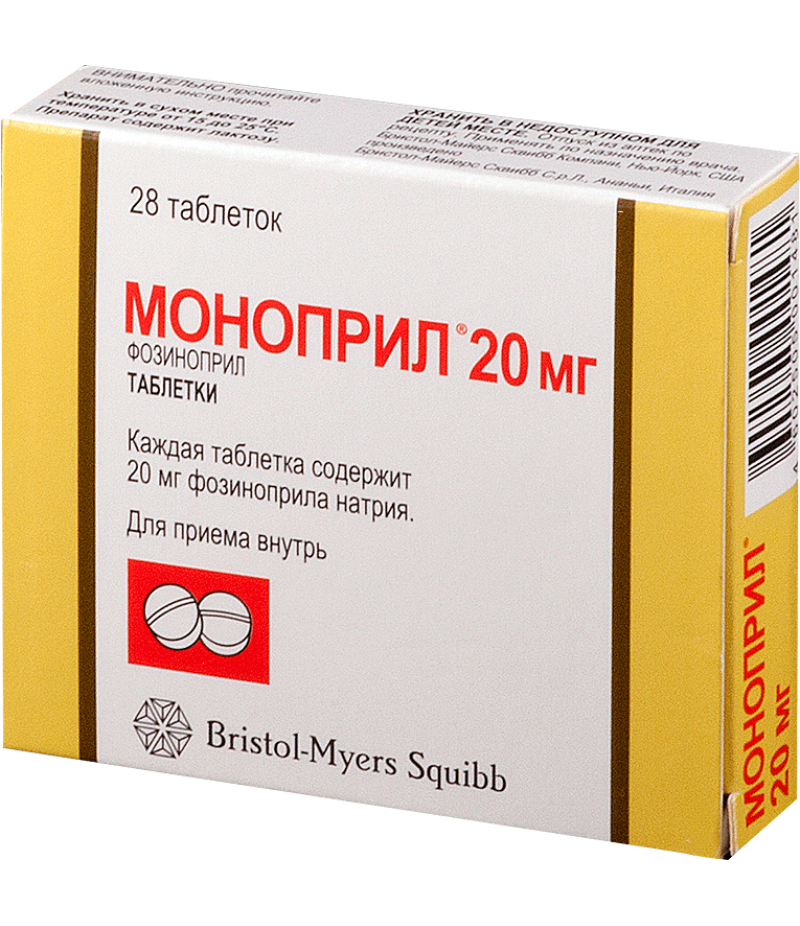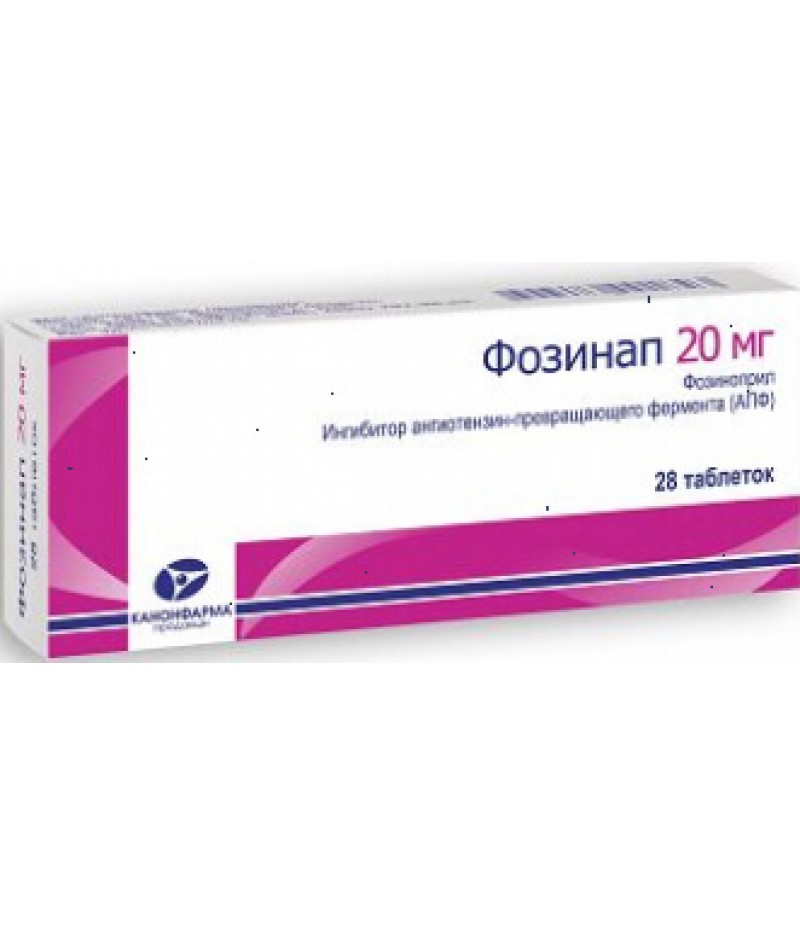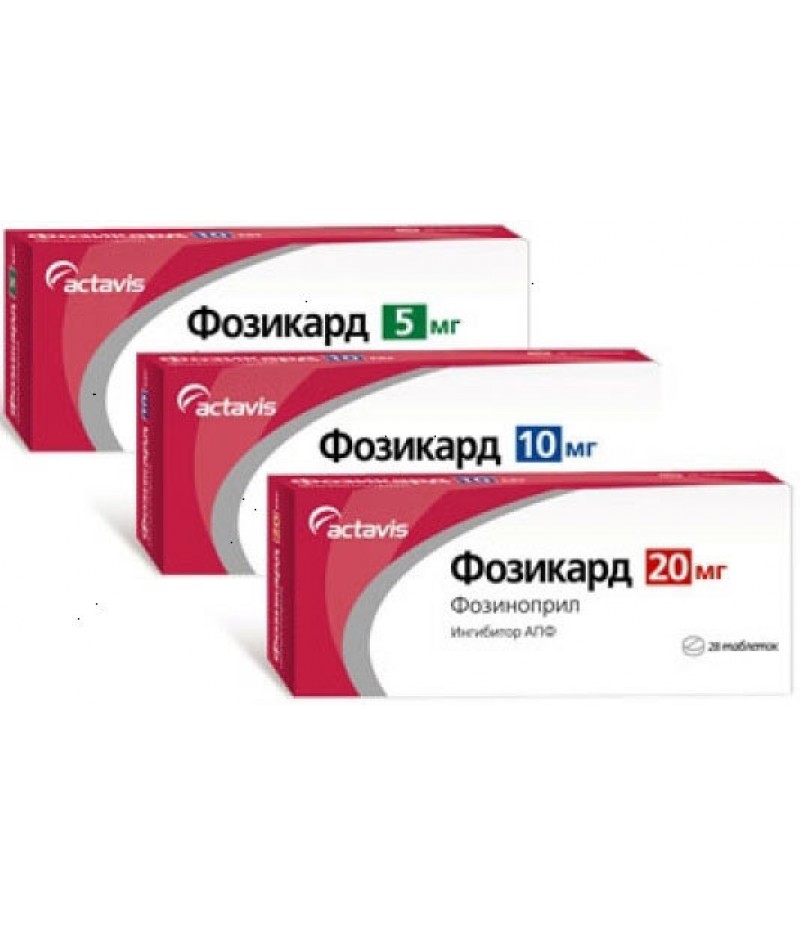Monopril 20mg #28
- $24.98
- 3 or more $21.90
- Availability:In Stock
Instruction for MonoprilReed more and buy Monopril onlineCompositionOne tablet of Monopril, depending on the dosage, may contain 20 or 10 mg of sodium fosinopril as an active substance.Additional substances: crospovidone, microcry..
Tags: tabs
Instruction for Monopril
Reed more and buy Monopril online
Composition
One tablet of Monopril, depending on the dosage, may contain 20 or 10 mg of sodium fosinopril as an active substance.
Additional substances: crospovidone, microcrystalline cellulose, lactose, polyvinylpyrrolidine, sodium stearyl fumarate.
Form of issue
Monopril are white, round, biconvex tablets without a smell, with a notch from one side and engraving "609" or "158" from the other.
Issued by:
14 such tablets of 20 mg each in a blister pack, two blisters in a paper bundle;
10 such 10 mg tablets in a plastic and aluminum foil blister, one or two blisters in a paper bundle;
14 such 10 mg tablets in a plastic and aluminum foil blister, one or two blisters in a paper bundle.
pharmachologic effect
The drug has antihypertensive effect.
Pharmacodynamics and pharmacokinetics
Pharmacodynamics
Angiotensin-converting enzyme inhibitor. Chemically, fosinopril sodium is the sodium salt of fosinoprilate ester.
Fosinoprilat is a selective competitive blocker of the angiotensin-converting enzyme. After inhibition of ACE, it prevents the transformation of angiotensin type 1 into angiotensin of the second type, which has a vasopressor effect. This leads to a decrease in angiotensin content of the second type in the blood - this causes a decrease in its vasoconstrictor activity and a decrease in the secretion of aldosterone.
Fosinoprilat inhibits the metabolism of bradykinin and therefore its antihypertensive effect is enhanced. Reduction of pressure is not accompanied by a decrease or increase in the circulating volume of blood, renal and cerebral blood flow, and blood supply to organs. After internal administration, the antihypertensive effect occurs within one hour, becomes maximum after 2-5 hours and lasts up to a day. A few weeks are needed to achieve the greatest therapeutic effect.
The antihypertensive effects of thiazide diuretics and fosinopril complement each other.
The drug helps reduce sensitivity to physical activity, reducing the severity of heart failure.
Pharmacokinetics
After oral intake, absorption from the intestine reaches 30-40% and does not depend on the intake of food. The maximum concentration in the plasma comes in three hours. Interaction with blood proteins reaches 95%.
Enzymatic hydrolysis of the drug occurs in the liver and intestinal mucosa. Fosinoprilat is excreted equally through the digestive tract and kidneys. Half-life is close to 11 o'clock.
Indications for use
Indications for use Monopril:
heart failure;
arterial hypertension (both in the form of monotherapy and as part of combined treatment).
Contraindications
Edema of the Quincke.
Hypersensitivity to any of the constituents of the drug.
Age to 18 years.
Pregnancy or lactation.
Use with caution when:
hyponatremia;
bipolar stenosis of the renal arteries;
desensitization;
stenosis of the aorta;
after kidney transplantation;
renal failure;
systemic lesions of connective tissue;
hemodialysis;
cerebrovascular diseases;
ischemic heart disease; heart failure in a chronic type of 3-4 degrees;
diabetes mellitus;
hyperkalemia;
oppression of hematopoiesis in the bone marrow;
gout;
in old age;
Conditions, accompanied by a decrease in the circulating volume of blood.
Side effects
The most likely side effects of Monopril.
On the part of the circulatory system: chest pain, syncope, orthostatic hypotension, hot flashes, arrhythmia.
On the part of digestion: vomiting, dyspepsia, pancreatitis, increasing the content of ALT and AST, hepatitis.
On the part of the nervous system: a violation of sensitivity, a sense of fatigue.
From the genitourinary system: oliguria, proteinuria, increased concentration of creatinine and urea.
On the part of the respiratory system: sinusitis, pharyngitis, cough, bronchospasm.
From the musculoskeletal system: pain in the joints and muscles.
Allergic reactions: photosensitization, pruritus, rash, Quincke's edema.
Instructions for use Monopril (Method and dosage)
Instructions for use Monopril recommends taking the drug inside. Dosage is selected individually.
Arterial hypertension. The initial dose is 10 mg once a day. To select a dose, it is necessary to observe the dynamics of the pressure decrease. The standard dose ranges from 11-40 mg once a day. If sufficient hypotensive effect is absent, diuretics can additionally be prescribed.
Heart failure. The initial dose is 5 mg to twice a day. Over time, the dose may be increased to 40 mg per day.
Overdose
Symptoms: severe depression of pressure, aetiology, shock, disturbance of water-mineral balance, acute course of renal failure, stupor.
Therapy: stop taking Monopril, rinsing the stomach, using sorbents, vasopressor drugs, intravenous saline injection, then symptomatic and supportive therapy. Hemodialysis is ineffective.
Interaction
Simultaneous use with antacids reduces the absorption of fosinopril, so they should be consumed at an interval of 2 hours.
When combined with lithium salts, the risk of lithium intoxication increases.
Nonsteroidal anti-inflammatory drugs suppress the antihypertensive effect of Monopril and similar drugs.
With simultaneous use of the drug with diuretics, excessive pressure decrease can develop.
Drugs containing potassium and potassium-sparing diuretics increase the likelihood of hyperkalemia.
Fosinopril activates the hypoglycemic effect of insulin and sulfonylurea derivatives; increases the risk of occurrence of leukopenia when used with cytostatic agents, immunosuppressants, Allopurinol, Procainamide.
Estrogens suppress the antihypertensive effect of Monopril.
Storage conditions
Store in a dry place in a temperature range of 15-25 degrees. Keep away from children.
Shelf life - Two years.
special instructions
It is not necessary to correct the dose of fosinopril in the elderly. Safety of use in children is not established.
It is necessary to be careful when driving, as there may be dizziness, especially at the initial stages of treatment.
Children
The drug is contraindicated for use in children.
During pregnancy (and lactation)
Pregnancy and lactation are contraindications for treatment with Monopril.
Reviews about Monopril
Reviews of Monopril indicate that the treatment regimen should be adjusted in each case, depending on the nature of the course of the disease and individual characteristics. Based on these estimates, we can conclude that the drug is more effective in the complex therapy.



